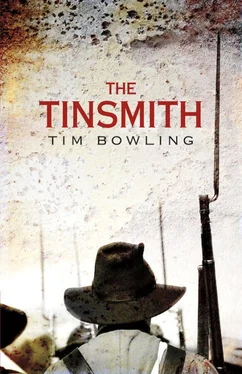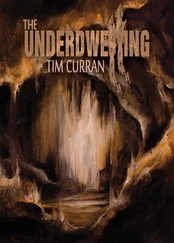The question took Gardner aback, but he saw no reason not to answer. “I saw him carrying a body into the wood.”
The surgeon grabbed Gardner’s elbow. His grip reached to the bone. “That man has done noble service. He has saved many from a lingering, painful death. If you are asked about him, I urge you…”
A cry of pain from behind spun him around. When he turned back and looked in Gardner’s eyes again, he spoke in a hoarse whisper.
“Don’t mention to any officer that you saw him carrying a body. By my oath, I ask this out of humanity… and… justice. If you believe, sir, in what the Union stands for, I urge you…”
“I don’t understand. Why would an officer ask me about him? Many soldiers are carrying bodies today.”
And then, with a jolt, Gardner recalled what body it was, and the manner of the death, and he was almost ashamed to admit that he saw his chance and took it. But the camera was not a toy, no more than a bible was a plaything to a preacher. And this surgeon, his weary, pained face, would make a wonderful study. Gardner struck a bargain.
“Agreed. But I have a single condition. If at some point I wish to make a study of you, you will pose for me?”
Already the photographer felt he had trapped a kind of ghost in his camera—something in this man seemed to flow out of him. He conceded listlessly to Gardner’s bargain and they shook on it. The photographer wondered how he could ever forget that firm handshake of blood and pus. The surgeon did not appear to notice Gardner’s lingering gaze, however. Only when he turned away did Gardner see that the surgeon held a severed lower leg in his other hand—it seemed to lead him like a child back into a nightmare.
Gardner was to get his study two days later, at a different field hospital, a mile to the south of the previous one. Apparently the bearded surgeon had moved as well, and stood awkwardly amid a group of half-collapsed canvas tents barely covering several dozen wounded. Smoke rose from a nearby cook fire. Gardner heard a rough snoring. A light breeze blew the usual death stench over the ground and tents. By then, the photographer had heard tell of an investigation about that mutilated corpse. Apparently, the dead man had been of much use to McClellan and Pinkerton in their gathering of information about the enemy. It was, according to rumours Gardner had heard, a delicate matter, given that Maryland had not yet committed to either side in the conflict. But no one asked the photographer anything. And the truth was, by September 21, Gardner was so puffed up with the success of his venture, and so inured to the misery and carnage all around him, that he gave little thought to that one farmer’s corpse.
And yet, when he bid the surgeon be still as he ducked under the cloth, Gardner was certain that, just over his study’s shoulder, peering out through a thin pillar of smoke, stood the very soldier whose actions had motivated the bargain he had struck with the surgeon. But when Gardner stepped out from the cloth, no soldier remained. And he half-doubted, despite all his subtle craft, that the exposed plate would capture anything but a flattened cornfield running away beneath a blank and pitiless sky.
September 19, the battlefield at Antietam
In the middle of a charred, broken field a hundred yards north of a barn serving as a Union field hospital, Horace Greaver swatted impatiently at a buzzing cluster of flies. If only the blasted lazy fools from the Quartermaster corps, he thought, would stop bringing in useless corpses, this day looked promising and profitable indeed. Dozens of corpses had been brought from the battlefield to the side of his large, black tent, and the fetid air told him many more would be arriving. Ah, but these lazy fools…
“If they don’t have a coupon,” Greaver said, “I don’t want them. This one’s no good to me. Take it back where you found it.” He pulled the brim of his worn bowler down over his bespectacled, watery, bloodshot eyes and turned away from the slack-jawed teamster’s assistant.
“Back? But I just drug it from clear over there, by the crick.”
“Did you even look for a coupon first, as I instructed you?” Greaver drew an invisible tiny square in the air before the man’s eyes, then angrily snatched it away. “Don’t waste my time. If you can’t be bothered to look for coupons, then at least bring me officers. Preferably Union. But Rebels too, if the rank’s high enough. The higher, the better.”
Greaver pulled a watch and chain from his vest and squinted at it. The truce for exchanging wounded had been on for nearly an hour. Soon he would set about exchanging the dead Rebel officers he’d managed to recover for any Union officers that his Confederate counterpart had collected. While it wasn’t impossible to collect a fee from a grieving Southern family for the safe return of their hero’s preserved body, it was altogether easier to restrict such dealings to the North.
He returned to the naked corpse set up on a few bare planks propped on two large wooden barrels. With the last of the blood already drained through the jugular vein, Greaver set about raising the carotid artery. He drew an imaginary line from the chest to a point midway between the jaw and mastoid process, all the while contemplating the exchange fee he might reasonably demand from the Rebel embalming surgeons. He could receive up to $80 per corpse for an officer in the North, so perhaps he should demand half that amount for any Rebel officers, should their embalmers run out of Union corpses for trade, of course. That would likely happen, since it was hard to imagine any Rebel being as organized and efficient as he was. Why, he had at least ten men out searching the battlefield, with Tomkins, that cool devil, acting as a manager. Just let the Rebels compete with that!
Greaver wiped a drop of sweat off his broad, fleshy nose, removed his glasses, and puffed on the lenses before placing the glasses gently back on. Then he turned the dead captain’s head to one side and, from the opposite side, made an incision about an inch and a half long just above the clavicle bone, near the juncture with the sternum. After cutting through the muscle, he found the small gap between the sternal head and clavicular head of the mastoid muscle, separated the fascia, and pushed the muscles to one side till the vessels appeared. He worked quickly and coarsely. Time was against him. The black seconds whirred inside the steady fly hum. But delicacy, in any case, was not required. Roughly he dissected the sheath of the exposed artery, inserted the needle underneath, and raised it to the surface. Then he slid a thin sliver of wood under the artery to hold it in place while he used two pieces of thread to tie a loose surgeon’s knot.
Damned glasses! Greaver removed them again and mopped his brow. The day was warm. He thought about stopping for a glass of water, but the dead were stacked like cord wood by the tent and, just as he paused, another of his hired workers approached through the haze bearing yet another corpse. Horace muttered into his sparse whiskers but could not repress a feeling of exultation. There was much money to be made in this work, as he’d predicted. And even more money than if he’d won a commission from the army to provide all their embalming services. It gladdened him that now he’d failed in that attempt, since to work independently would prove far more profitable.
He neatly looped his glasses over his ears and bent to take up his bulb syringe. The artery hadn’t emptied of blood yet, due to the suddenness of death, but Greaver didn’t have time to waste on cosmetics—if the skin looked too flushed, so be it. Preservation was more important. He grinned as he inserted the drain tube into the internal jugular vein and started the draining. His solution, which he had perfected just before the battle, worked wonderfully. Indeed, it was a joy to insert the injection needle into the carotid and work the bulb syringe, shooting the perfect strength of bichloride of mercury through the vessels. A few pints at most for a private, a few quarts for an officer, and the body would remain as natural-looking as if asleep; and it would remain that way for no less than two weeks. Beyond that, Greaver guaranteed nothing—so much depended on the weather.
Читать дальше












